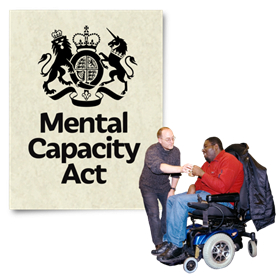People who lack capacity

Mental Capacity Act
The Mental Capacity Act says:
- assume that a person can make their own decisions until they are assessed as not being able to
- only a qualified person can assess the person such as a social worker or doctor
- a person may have the capacity for one decision such as what to eat, but not another such as where to live
- they should be given all possible help to make specific decisions before being assessed as lacking capacity
- people have the right to make unwise decisions

Making a decision
If the person cannot decide for themselves, we will make sure that the decisions are made in their best interest.
We will:
- involve the person in decisions as much as possible
- consider their views, wishes, needs and well-being
- ask family and friends to support and represent the person
If this is not possible, they can have an independent advocate. The advocate will represent their views and wishes and challenge our decisions if necessary.

Looking after the person’s money
If the person does not have the capacity to make decisions about their money, we will find out if there is someone who can represent them.
For example:
- enduring power of attorney
- lasting power of attorney
- deputyship under the court of protection
- any other person who is dealing with their affairs, for example, someone who has been given appointees for their benefit payments

Financial assessment
We assess people who lack capacity in the same way as everyone else. We will make sure they are fully represented and decisions are made in their best interest.
Find more information on finance and paying for care.
